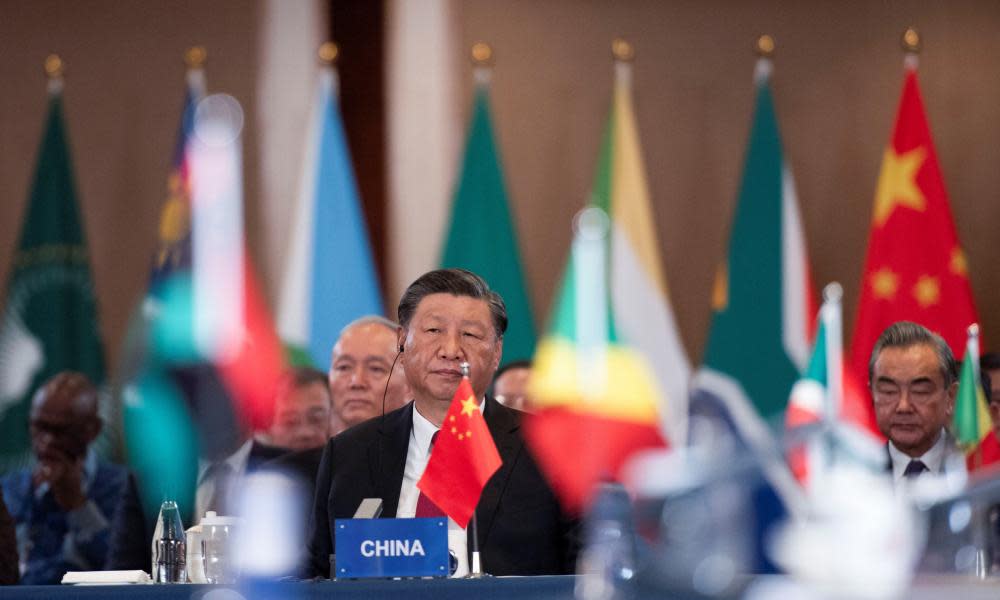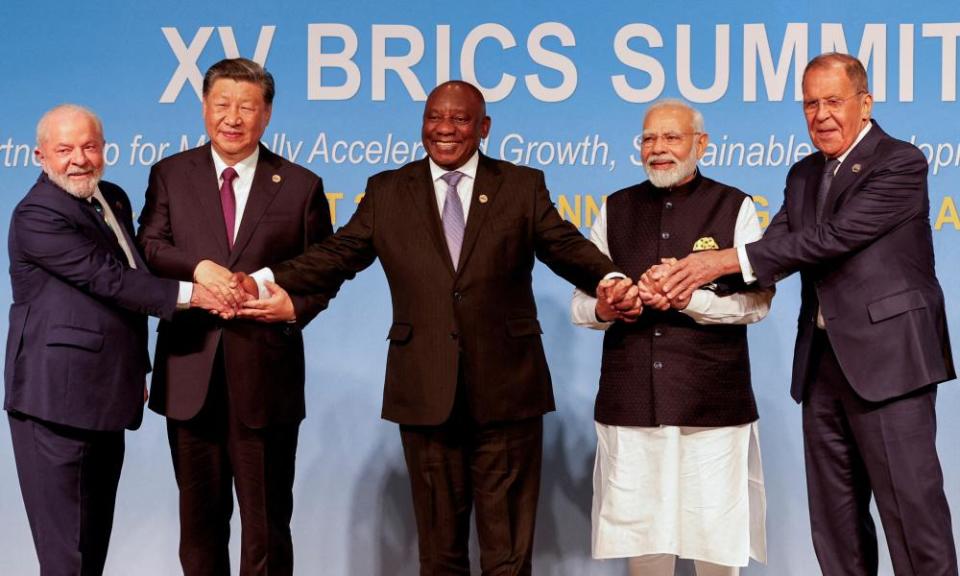Xi Jinping’s wants a ‘multipolar world’, as China accelerates its shift away from the west

It was a difficult summer for China’s leader, Xi Jinping. He was faced with natural disasters, economic uncertainty and a roster of disappearing ministers that had observers around the world speculating on their fate.
But one brief highlight among the gloom was the Brics summit in Johannesburg, in which six new countries were added to the bloc of emerging economies, more than doubling its size. With the addition of the new members, Brics will account for nearly half of the world’s population.
Xi had long called for the admission of new members to strengthen the bloc’s voice on the world stage and the expansion comes just as Beijing attempts to preserve and expand its international influence in the face of increasingly strained relations with the US.
Related: Have we reached peak China? How the booming middle class hit a brick wall
China’s domestic troubles are piling up, with slowing economic growth and high youth unemployment. The war in Ukraine has led to Beijing providing an economic lifeline to Russia which has strained relations with the west and made China increasingly focused on winning influence in the global south.
Burnishing the country’s international image is key to this goal; research published this year by Pew found that across all the rich countries it surveyed, a majority of people had an unfavourable opinion of China. In middle-income countries however, attitudes were rosier, with more than 70% of people in Kenya and Nigeria reporting positive views on China.
So although Beijing has not yet given up hope of preserving dialogue and trade with western partners, its diplomatic efforts are now split between maintaining those relations and making an ideological and economic appeal to those middle-income countries in the global south.
“As the largest developing country, China is a natural member of the global south,” Chinese vice-president Han Zheng told the UN general assembly in September. “It breathes the same breath with other developing countries and shares the same future with them”.
The fact that, as of next year, Brics will include countries as diverse as Ethiopia, Iran and Argentina, with Russia and China at the helm, is a gift for Beijing because it “chips away at the credibility of the western-led, international rules-based order,” says Eric Olander, the editor-in-chief of the China-Global South Project website.
Olander notes that the desire to build a “parallel international governance architecture” could be partly motivated by a desire in Beijing to make up for lost access to western markets.
A powerful economic and ideological appeal
Beijing’s emphasis on building a “multipolar world” is a clarion call for developing countries, apparent in the gradual shift from the belt and road initiative (BRI) to the Global Development Initiative (GDI).
Launched ten years ago, the BRI has, according to China’s foreign ministry, galvanised $1trn of investment in nearly 150 countries. The willingness of Chinese lenders to extend loans to countries that often struggle to get financing from institutions like the World Bank won Beijing friends in many places. But it also led to huge amounts of debt and, in some cases, resentment from local populations. Research published this year found that China spent $240bn bailing out countries struggling with their BRI debts between 2008 and 2021.

And so in 2021, at an address to the United Nations, Xi launched the GDI, a programme to promote international cooperation in a range of policy areas compatible with the UN’s sustainable development goals, including poverty alleviation and responses to climate change. Soon after the Brics summit, Beijing announced the launch of a $10bn fund to support the GDI.
China’s struggling economy may threaten to limit its ability to shower cash on pliable neighbours. One major difference between the BRI and the GDI is the scale of funding offered by the initiatives. The GDI “will not be able to compare with the BRI” in terms of financial support, says Yun Sun, the director of the China programme at the Stimson Center, a US thinktank.
But it isn’t the only tool at its disposal. Another sign of Beijing’s growing influence in the south is the spread of Confucius Institutes, Chinese state-backed cultural and educational centres that offer Mandarin lessons in more than 100 countries around the world.
In the UK, Europe and the US, the centres have come under scrutiny over alleged limits to free speech in the classrooms. Rishi Sunak, the UK’s prime minister, pledged to close them last year, although he has since rolled back on that promise. But in the US, 111 have been closed since 2018, according to the National Association of Scholars, a New York-based non-profit. Just 10 remain.
Compare that to Africa, Latin America, and South-east Asia, where the institutes remain popular and where the “political questions about what they’re teaching and how they’re teaching it is not as sensitive,” said Olander. There are now 57 in Latin America and the Caribbean, according to the Andrés Bello Foundation, an institute in Colombia that researches the region’s relationship with China. In the last two years, the number of people applying to study Chinese language teaching at the National University of Laos’s Confucius Institute has tripled, to 562.
As hopes of political liberalisation in China fade into the distant past, Beijing’s primary hope for wielding influence in the west is from its weight as an economic superpower and important partner in tackling transnational issues, such as climate change.
But to the global south, Beijing promotes an alternative world order, with an ideological and economic appeal that remains powerful.

 Yahoo News
Yahoo News 
